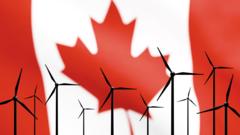
Canada's Election: Energy and Economic Security in the Shadow of US Tariffs
The Looming Threat: US Trade Policy and Canadian Sovereignty
As Canada heads to the polls, the spectre of potential tariffs and trade disputes with its largest trading partner, the United States, casts a long shadow over the election landscape. Energy security and economic stability have emerged as pivotal issues, influencing voters' decisions and shaping the platforms of major political parties. The unpredictable nature of US trade policy has forced Canadian policymakers to re-evaluate their economic strategies and explore avenues for diversification.
Energy Sector Under Pressure: Pipelines and Global Markets
The energy sector, a cornerstone of the Canadian economy, finds itself at a critical juncture. Existing pipelines face capacity constraints, hindering the ability to transport crude oil to global markets. Proposed pipeline projects have encountered significant opposition due to environmental concerns and Indigenous rights, creating further uncertainty for the industry.
Key Issues in the Energy Debate:
- Trans Mountain Pipeline Expansion: The ongoing debate surrounding the Trans Mountain pipeline expansion remains a focal point, with supporters emphasizing its economic benefits and opponents highlighting its potential environmental impact.
- Carbon Tax and Climate Change: The federal carbon tax policy is another contentious issue, dividing opinions on its effectiveness in reducing greenhouse gas emissions and its impact on industries.
- Transition to Renewable Energy: The transition to renewable energy sources is gaining momentum, but questions remain about the pace and feasibility of this transition, as well as the role of government support and investment.
Economic Diversification: Beyond the US Market
Recognizing the vulnerabilities of relying heavily on the US market, Canadian policymakers are actively pursuing economic diversification strategies. This includes strengthening trade ties with other countries, fostering innovation in emerging sectors, and investing in infrastructure to improve competitiveness.
Strategies for Economic Diversification:
- Strengthening Trade Agreements: Canada has been actively pursuing trade agreements with countries in Asia, Europe, and other regions to reduce its dependence on the US market.
- Investing in Innovation: The government is investing in research and development, supporting startups, and creating incubators to foster innovation in sectors such as technology, clean energy, and advanced manufacturing.
- Developing Infrastructure: Investments in transportation infrastructure, such as ports, railways, and highways, are aimed at improving Canada's ability to trade with global markets.
Political Platforms: Addressing Energy and Economic Security
The major political parties have presented their platforms for addressing energy and economic security, offering voters distinct visions for Canada's future. Their approaches to these issues will undoubtedly influence the outcome of the election.
Party Platforms: A Brief Overview:
Each party offers unique solutions to these complex problems. Here's a general overview. For specific details, consult their official platforms.
- Party A: Focuses on continued support for existing energy infrastructure while investing heavily in green technology and retraining programs for workers in the fossil fuel industry. Their economic plan centers around strategic investments in key sectors to boost job creation and productivity.
- Party B: Advocates for a more rapid transition to renewable energy, proposing stricter regulations on the oil and gas sector and increased carbon pricing. Economically, they emphasize income redistribution and social programs to address inequality and support vulnerable populations.
- Party C: Prioritizes reducing government regulation and taxes to stimulate economic growth, arguing that a thriving private sector is the best way to ensure economic security. On energy, they advocate for responsible development of natural resources while acknowledging the importance of environmental protection.
Voter Concerns: Jobs, Environment, and the Future
Canadian voters are deeply concerned about the potential impacts of US trade policy on jobs, the environment, and the overall economic well-being of the country. The election outcome will hinge on which party can effectively address these concerns and offer a credible plan for a secure and prosperous future.
Conclusion: A Pivotal Moment for Canada
Canada's federal election is taking place at a critical juncture, as the country navigates the challenges of global trade tensions and the imperative to transition to a sustainable energy future. The choices made by voters will have profound consequences for the nation's economic and energy security for years to come.
```